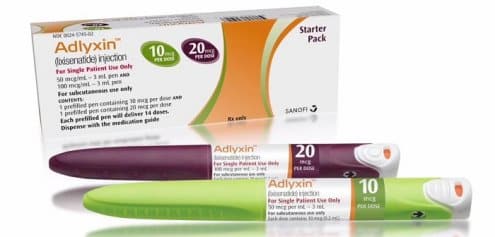What is Adlyxin (Lixisenatide)?
Lixisenatide is a drug that is indicated for the improvement of glycemic control in adults with type 2 diabetes, as an adjunct to a healthy diet and exercise. Administered via injection, this medication should only be taken in combination with metformin, sulfonylurea (alone or with metformin), pioglitazone (alone or with metformin) or basal insulin therapy (alone or with metformin). The lixisenatide brand name is Adlyxin. The manufacturer who makes Adlyxin is Sanofi. The medication was approved by the Food and Drug Administration (FDA) in July, 2016.
What is this medication used for?
Adlyxin is used to improve glycemic control in adults with type 2 diabetes in conjunction with at least one other type of therapy.
How to take Adlyxin
Adlyxin is administered once daily via subcutaneous injection into the thigh, abdomen or upper arm. It must not be administered intravenously or intramuscularly.
When Adlyxin is taken at the same time as sulfonylurea or alongside basal insulin therapy, the patient should be aware of the potential of hypoglycemia. Your doctor may want to change your dose of either drug if you are taking this drug. Taking Lixisenatide with drugs that increase the heart rate can be dangerous and severe hypoglycemia can also occur. This is defined as a plasma glucose level below 2.0 mmol/L. Severe hypoglycemia can cause permanent brain damage, similar to anoxic brain injury.
If the patient is also taking drugs that rely on a threshold effect for efficacy, like antibiotics, or a medication like acetaminophen, these other drugs should be administered at least an hour before Adlyxin is administered via injection.
Adlyxin is available in a pre-filled, auto injectable pen in dosages of 10 µg and 20 µg. Patients should not share pens nor use expired devices.
Adlyxin side effects
Common side effects
- Nausea
- Vomiting
- Diarrhea
Severe side effects
- Upper respiratory tract infections
- Influenza
- Urinary tract infection
Adlyxin should not be taken by pregnant or nursing women. Animal studies of the drug have shown evidence of reproductive toxicity. Insufficient data exists regarding the use of Lixisenatide in pregnant women, so if a woman becomes pregnant during treatment, the administration of Adlyxin should be abandoned.
Lixisenatide dosage
The recommended starting dose of Adlyxin is 10 µg once daily for 14 days. The maximum dosage for lixisenatide is 20 µg once daily, which can be implemented from day 15. If there are problems adhering to the maintenance dose, it can be reduced again to 10 µg. Consider increasing the dosage to 20 µg again within 14 weeks of the start of treatment.
Adlyxin has not been studied in conjunction with short-acting insulin therapy, nor in patients with type 1 diabetes mellitus. It has not been evaluated for the treatment of diabetic ketoacidosis.
Adlyxin should be used with caution in geriatric patients older than 65 years of age. A greater sensitivity of some older people to the active ingredients is a possibility. The efficacy on Lixisenatide has also not been established in pediatric patients (or those younger than 18 years of age). Adlyxin is also not recommended for use by patients with severe gastrointestinal disease (i.e., gastroparesis, stomach/gastric surgery or inflammatory bowel disease).
During a clinical trial amongst healthy subjects undergoing serial ECG monitoring, administration of Lixisenatide was shown to cause an increase in heart rate. Therefore, caution should be observed when administering Adlyxin to patients with conditions that might be exacerbated by an increase in heart rate, such as tachyarrhythmias.
Doctor’s Recommendation
Many patients starting lixisenatide may experience gastrointestinal side effects like nausea and vomiting, often due to delayed stomach emptying. While these symptoms can be tough at first, many patients get used to them over time. Headaches and dizziness are also possible. In studies, some patients stopped treatment because of these effects. To help manage these side effects, it’s recommended to start with smaller amounts of food and eat slowly.



